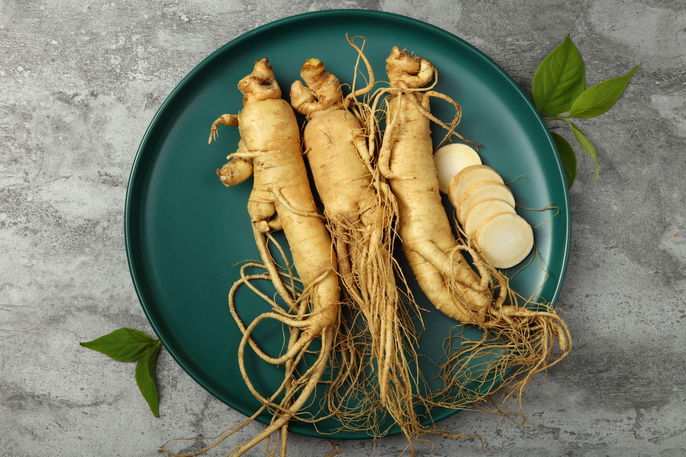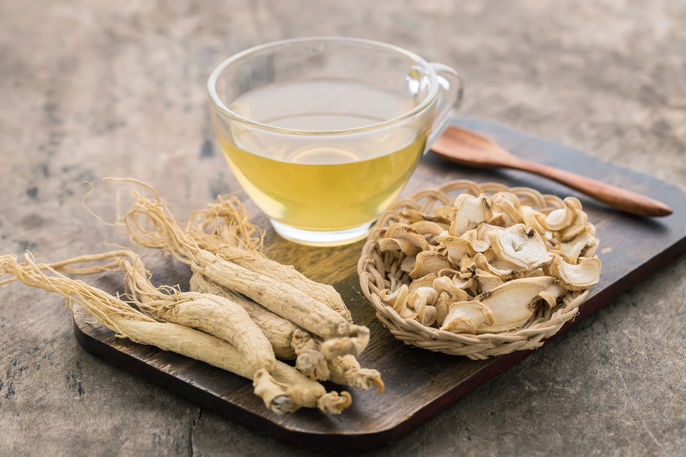What is it:
Ginseng is a medicinal plant that contains ginsennosides, which are compounds with stimulating and revitalizing properties. They can decrease fatigue, improve mood and boost mood and physical or mental performance.
Ginseng also has adaptogenic action, meaning it can help to reduce stress and anxiety. It helps to decrease cortisol production, which is a hormone that is released in high quantities during periods of stress.
The main types of ginseng are asian, brazilian and american ginseng. They contain similar properties and can be purchased in natural health stores or pharmacies. They are white or red in color, and can be purchased as roots, tinctures, powder, capsules or teabags.

Health benefits
Because of its adaptogenic and antioxidant action, ginseng can be used to achieve the following health benefits:
1. Improve physical performance
Ginseng improves physical performance due to its ability to reduce fatigue and increase agility and strength. It can be used to enhance performance in athletes and people who workout.
2. Reduce stress and anxiety
Ginseng contains saponins, bioactive compounds that stimulate the production of dopamine. Dopamine is a neurotransmitter that promotes general well being and reduces stress and anxiety.
3. Improve sexual performance
Because it improves circulation and acts on the nervous system to produce dopamine, ginseng can actually increase the sensation of pleasure and libido, which can improve sexual performance.
4. Boost memory and concentration
Ginseng acts directly on the hippocampus, the area of the brain responsible for memory. It boosts memory capacity, attention and concentration, making it a great option for students during exam periods, for example.
5. Strengthen the immune system
Because of its immunomodulatory effects, ginseng increases the amount of immune cells in the blood and strengthens the immune system. It can help to prevent colds and flus or decrease their duration.
6. Increase blood circulation
Ginseng contains ginsenosides, which are bioactive compounds that are responsible for the release of nitric oxide. This substance dilates blood vessels, which increases blood circulation.
7. Prevent cardiovascular disease
Because of its antioxidant action, ginseng combats free radicals and prevents the oxidation of fat cells. This can help to regulate “bad” cholesterol or LDL levels, preventing cardiovascular diseases like atherosclerosis and heart attacks.
8. Prevent the development of cancer
Because it is rich in antioxidant compounds, like saponins and flavonoids, ginseng helps to combat free radicals to prevent the emergence of some types of cancer (like lung cancer, liver cancer, pancreatic cancer, ovarian cancer and stomach cancer).
Nonetheless, more studies rae needed to support the possible effect of ginseng on the prevention of cancer.
Types of ginseng
There are many different types of ginseng. Although they contain similar properties, they vary based oh their composition and origin:
- Asian ginseng (Panax ginseng): Originally from China and Korea, and considered to be the “true ginseng”, this plant is rich in ginsenosides, which are substances that strengthen the immune system, reduce fatigue, and boost performance and mood.
- Brazilian ginseng (Pfaffia glomerata): Considered to be the “true substitute” for Asian ginseng, this plant contains fumaric acid, glomeric acid and existerone, which are compounds that improve memory, strengthen the immune system, and reduce stress and anxiety.
- American ginseng (Panax quinquefolius): Cultivated in the USA and Canada, this type of ginseng is also rich in ginsenosides and possess the same properties as Asian ginseng.
- Indian ginseng (Withania somnifera): Also known as ashwagandha, this is a root that is rich in alkaloids, lactones and saponins. These compounds contain soothing and stimulating compounds, and are commonly used to improve mental and physical performance, as well as reduce anxiety.
- Siberian ginseng (Eleutherococcus senticosus): Originally from China and russia, this plant contains eleutherosides, which are immunomodulatory compounds that strengthen the immune system and aid in the treatment of depression, mental fatigue and lack of concentration.
The type of ginseng recommended varies depending on the health objective to be addressed. Therefore, to choose the best type of ginseng, you should speak with a doctor or medicinal plant specialist.
How to use
Fresh or dry ginseng roots can be found as powder form, teabags, tinctures or capsules.
- Powder: Dissolve 1 teaspoon in juices or meals to take once per day
- Tea: Drink 2 to 3 cups of tea per day, with meals
- Tincture: Dilute 1 tablespoon in a cup of water and drink once per day, with a meal
The recommended dose for ginseng capsules varies from 40mg to 500mg per day. You can take 1 to 4 capsules per day, ideally with meals.
Because the type, dosing and duration of ginseng use varies depending on your health status and health goals, it is best to discuss taking it with a doctor or medicinal plant specialist before starting.
Ginseng recipes
Some easy recipes that incorporate ginseng are:

1. Ginseng tea
Ingredients:
- 150 ml (about 5 oz) of water
- 0.5 g to 2 g of ginseng roots
How to prepare:
Boil the water, and once it is bubbling, add the ginseng. Cover the pot and leave over low heat for 10 to 20 minutes. Strain and drink 2 to 3 cups per day.
2. Pasta and ginseng soup
Ingredients:
- 1.5 L of water
- 15 g of fresh ginseng roots
- 3 onions
- 3 garlic cloves
- 1 carrot
- 2.5 cm of ginger
- 150 g of mushrooms
- 200 g of pasta
- 1 handful of chopped parsley
- Salt and pepper to taste
- 2 tablespoons of olive oil
How to prepare:
In a pot, heat up the olive oil and add the onions and garlic. Stir fry until golden. Add the water, ginseng, carrots, ginger and mushrooms, and allow to cook on medium heat until the carrot is soft. Add the pasta and season to taste. Cook until the pasta is soft. Remove the ginseng and ginger and toss, and serve the soup while hot.
3. Ginseng tincture
Ingredients:
- 25 g of goji
- 25 g of ginseng;
- 25 g of oats;
- 5 g of licorice root
- 400 ml (about 13 oz) of vodka
How to prepare:
Chop up all the ingredients and place in a dark, clean glass recipient. Pour the vodka over the ingredients, cover and store in a dark area for 3 weeks.
During this time, you can strain the tincture as needed and store in a cupboard. It can be used for up to 6 months. To use it, dilute 1 tablespoon of this tincture in a cup of water and drink it daily with meals.
Possible side effects
The side effects associated with ginseng use include nausea, vomiting, diarrhea and stomach ache.
Ginseng can cause irritability or insomnia, especially if used in high doses or combined with sources of caffeine, like coffee, green tea and cacao.
Although they are more rare, ginseng can cause more serious side effects like high blood pressure, anxiety, headache, nose bleeds or hypoglycemia.
Ginseng should not be used for longer than 3 months, and periods of use should be alternated with pauses.
Contraindications for use
Ginseng is not recommended for children or people with cardiac diseases or bipolar disorder. It is not recommended for pregnant or breastfeeding women.
People who take medications to manage blood pressure or diabetes, anticoagulants, immune system modulators, stimulants, hormone replacement therapy, contraceptives, morphine or antidepressants should speak to their doctor before starting ginseng, as this plant can alter the effect of these medications.






























